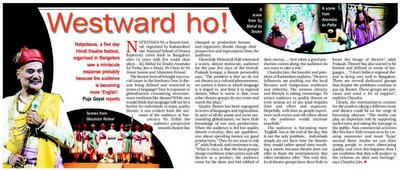Westward Ho!

(Click on Image to read article)
Introduction: Natyotsava, a five day Hindi theatre festival, organised in Bangalore saw a miniscule response probably because the audience is becoming more "English". Puja Goyal reportsNATYOTSAVA '05, a theatre festival, organised by Kadamabari saw National School of Drama Repertory come back to Bangalore after 14 years with five world class plays - Taj Mahal ka Tender, Anamdas ka Potha, Jan-e-Maan, Us Cheez ke En Amne Samne and Ghasiram Kotwal.
The theatre festival brought two crucial issues in the forefront; One: Is theatre being defined and restricted in terms of language? Two: Is exposure to globalisation consuming entertainment mediums like theatre? While one would think that language will not be a barrier for individuals to enjoy quality theatre, it was evident from the outcome of the audience at Natyotsava ë05. Either the audience perspective towards theatre has changed or production houses and organisers should change their perspective and expectations from the audience.
Chowdiah Memorial Hall witnessed a scanty, almost miniscule, audience for the past five days of the festival. Prakash Iyengar, a theatre personality says, "The problem is that we do not see theatre as a cultural phenomenon, we narrow it down to which language is it staged in, and limit it to regional theatre. What is worse is that, even other theatre groups do not come and watch the plays." Quality theatre has been segregated in terms of languages and regionalism.
In spite of all the pomp and noise surrounding globalisation, we have little knowledge of our own productions. "When the audience is fed low quality theatre everyday; they are apprehensive about spending money on good productions. ìThey do not want to risk it!" adds Prakash, and continues to say, "What is crazy is that the local groups charge exorbitant ticket prices and sell theatre as a product, the audience come for the show and feel robbed of their money. And when a good production comes along, the audience do not want to take a risk."
Chandra Jain, the founder and president of Kadambari explains, "Western influences are pushing out the local flavours and indigenous traditions and ethnicity. The western identity and lifestyle is taking centrestage. To attract audience to quality theatre or even serious art of any kind requires time and effort and exposure. Hopefully, with time as people experience such events and tell others about it, the audience would increase manifold."
The audience is becoming more "English", but at the end of the day, this is not the only problem, individuals simply do not have time for theatre; they would rather spend time watching a movie, because theatre does not offer to them the entertainment that other mediums offer. "Not only this, local theatre groups have done little to boost the image of theatre", adds Prakash. Theatre has also started to be limited and defined in terms of languages. "I don't believe regional theatre
is doing very well in Bangalore. There are several dedicated groups that despite the problems continue to put up theatre. These groups are precious and need a lot of support", explains Chandra.
Clearly, the entertainment content for the youth is taking a different route and theatre could be on the verge of becoming obscure. "The media can play an important role by supporting such events and taking the message to the public. Non-commercial activities like this have little resources so by creating awareness and more "hype" around these, maybe we can draw young people to events showcasing quality, and once this happens then I am confident that they will awaken to the richness on their own heritage," says Chandra Jain.
Source: Vijay Times, Life : CenterStage- 3.
Copyright © 2005 Puja Goyal.
Comments